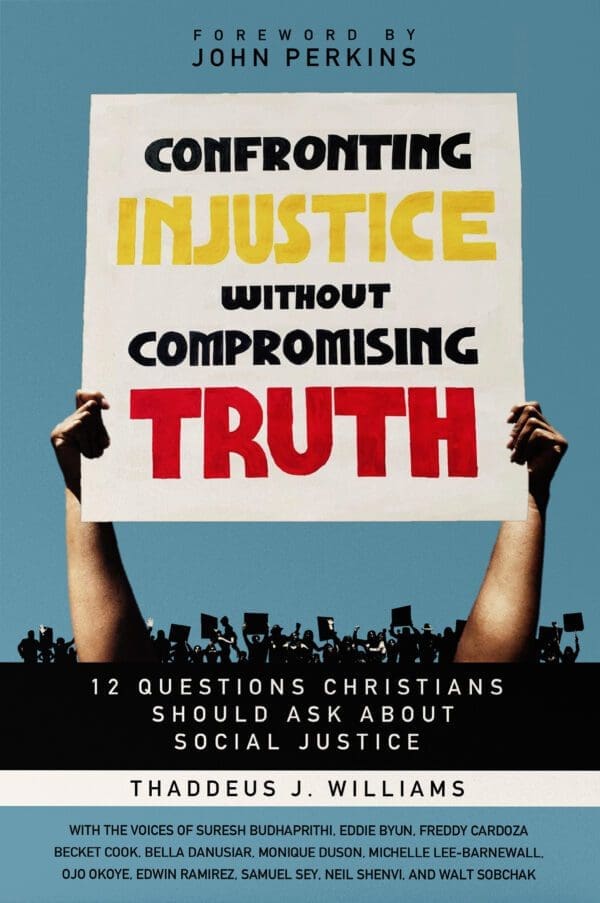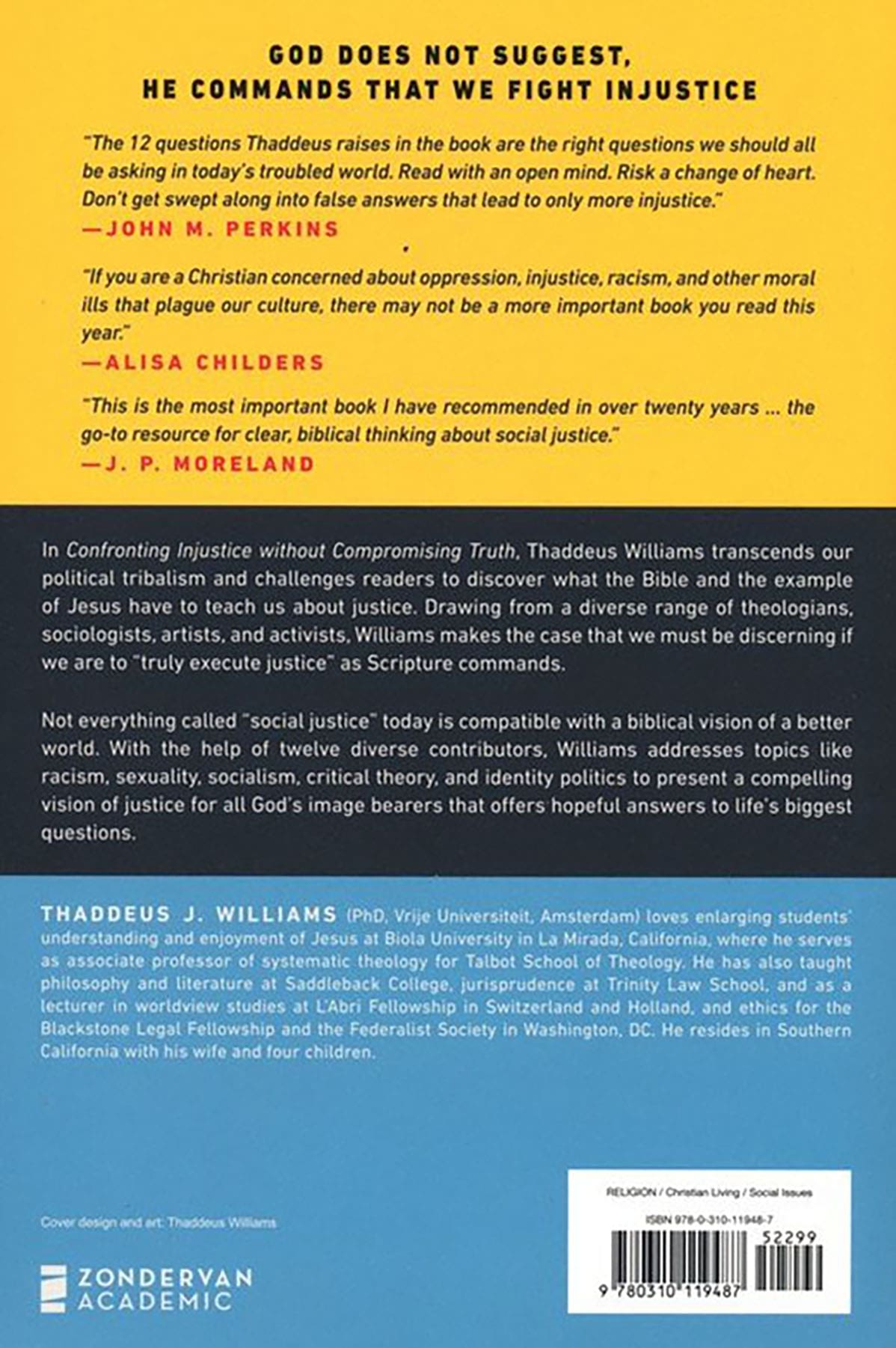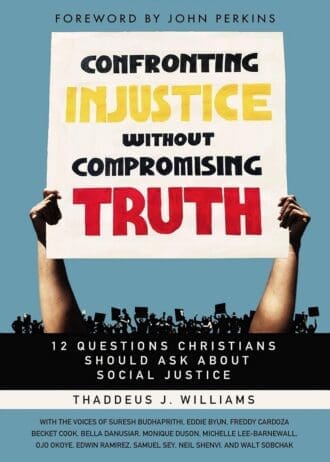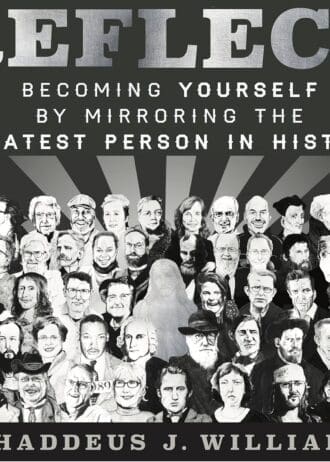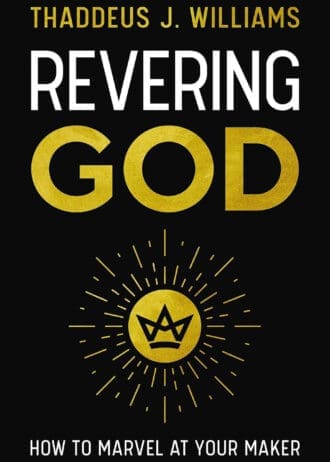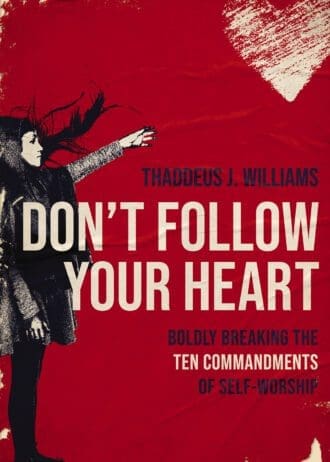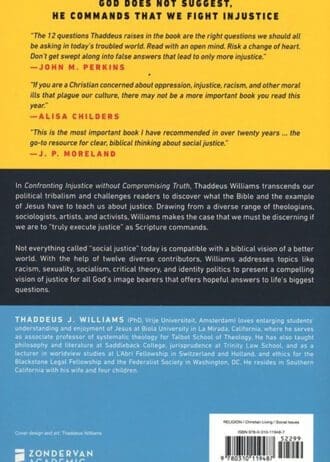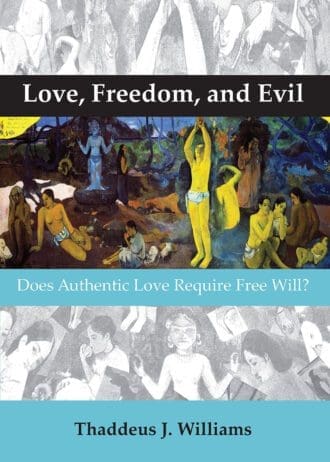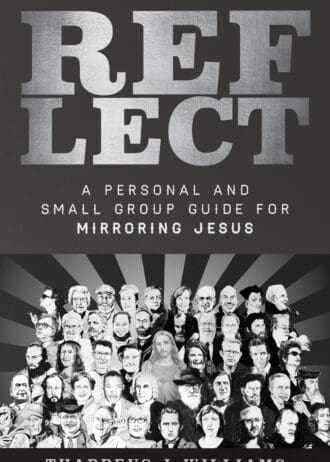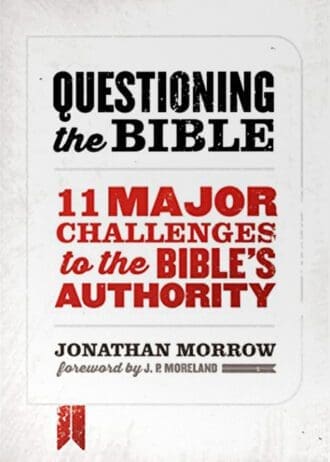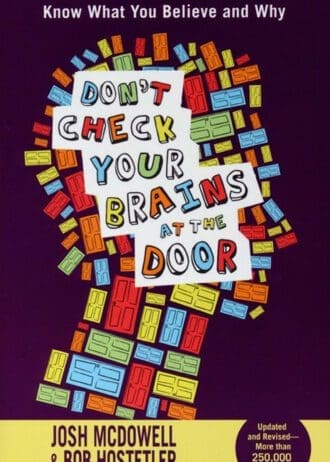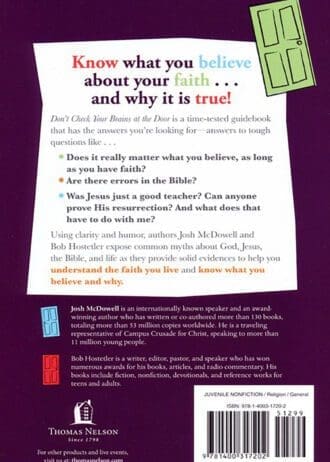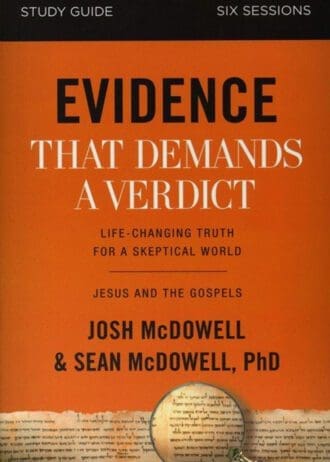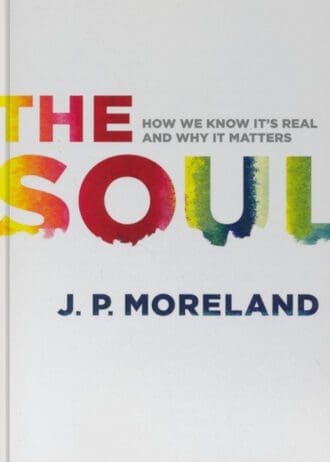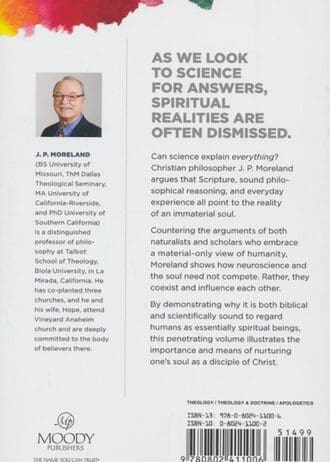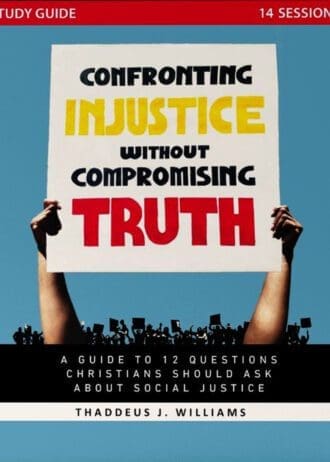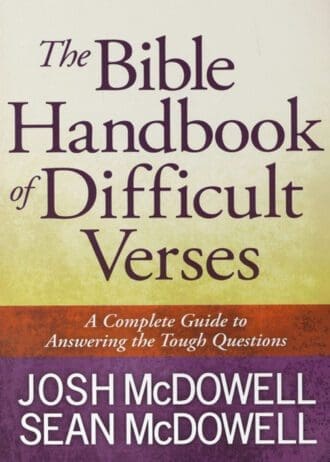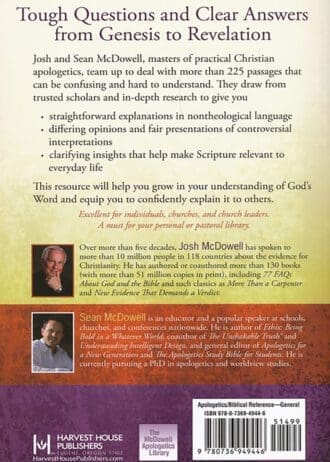In today’s volatile climate, it’s vital to be–or become–a people who seek justice. But for Christians, this must be a social justice that is truly biblical, fashioned according to God’s ways. With input from a diverse range of theologians, sociologists, artists, and activists, Thaddeus Williams addresses topics of racism, sexuality, abortion, culture, tribalism, identity politics, and more in Confronting Injustice without Compromising Truth.
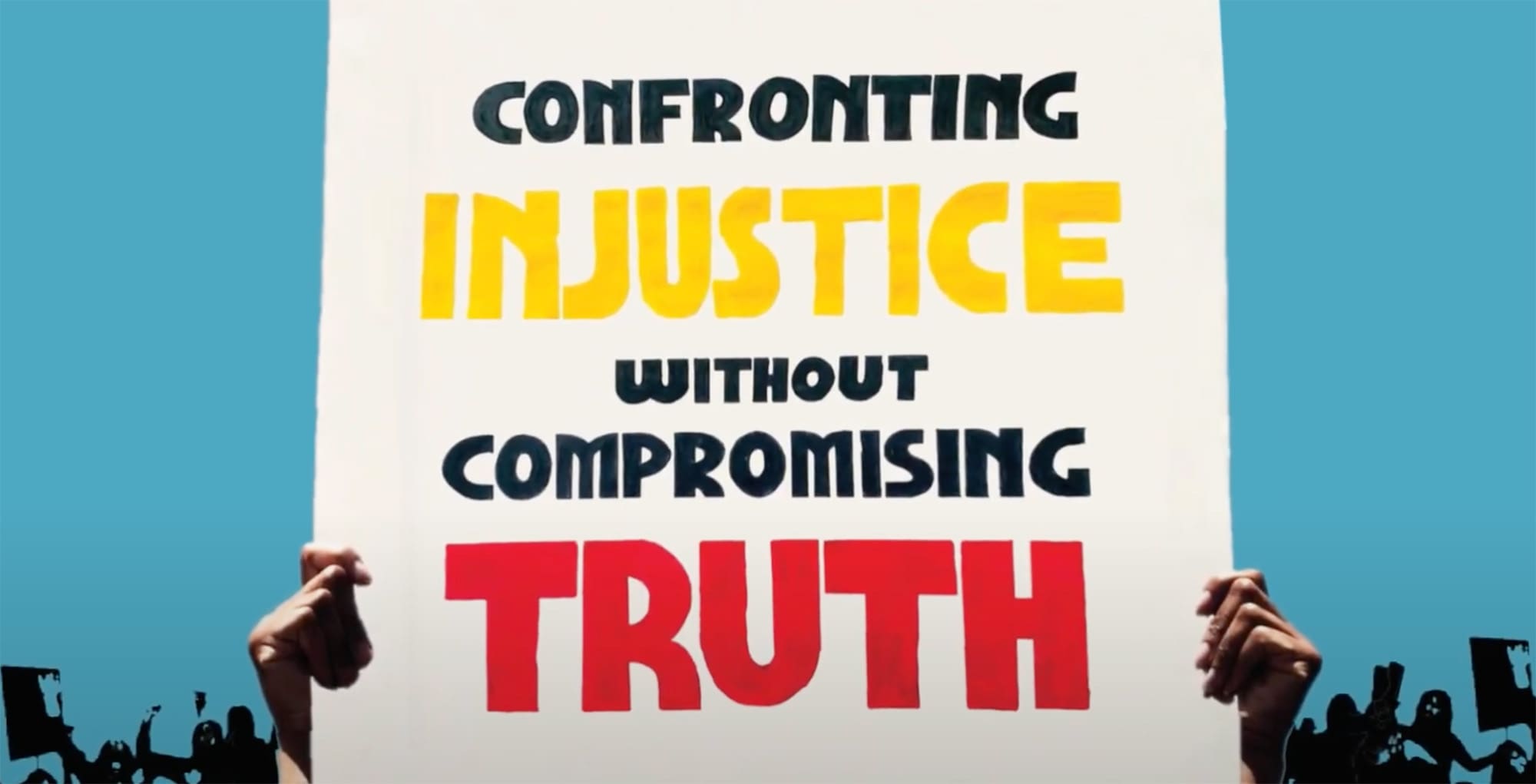
Editorial Reviews
‘The 12 questions Thaddeus raises are the right questions we should all be asking in today’s troubled world. Read with an open mind. Risk a change of heart. Don’t get swept along into false answers that lead to only more injustice.’ — JOHN M. PERKINS, president, The John and Vera Mae Perkins Foundation; author of One Blood
‘As an African American pastor of a predominately African American church, I’m often asked what book I would recommend on the controversial topic of social justice. Thaddeus Williams has written my top recommendation. Thoroughly biblical, well- reasoned, and deeply charitable, this balanced book is a beacon of gospel light to every believer desiring to confront injustice armed with the truth of the Word. There are few issues of our day more important for Christians to get right than this one, and we owe Dr. Williams a debt of gratitude for his courage and skill applied to the production of this excellent work.’ — ANTHONY D. KIDD, pastor of preaching, Community of Faith Bible Church, South Gate, California
‘Thaddeus Williams tackles the emotional topic of social justice in a way that is simultaneously personable, compassionate, and biblically faithful. Thaddeus doesn’t try to ‘Christianize’ secular social justice ideology with a few Bible verses taken out of context. Rather, he works toward a faithful presentation of the biblical data. As a theologian working on justice questions, I am grateful for this contribution to this field.’ — KRISTA BONTRAGER, theologian at Theology Mom, cohost of All the Things podcast
‘Williams shows us how to think from the Christian faith, rather than allowing the categories and concerns of the day to rule the way Christians talk about race, politics, and inequality. This well-written, highly engaging book deserves careful consideration by every thoughtful Christian concerned about the issues of our time–not least because it allows Scripture to question some of our key assumptions about these issues, while also providing alternative ways to think about and engage them as kingdom citizens.’ — UCHE ANIZOR, associate professor of theology, Biola University; author of How to Read Theology
‘Are you concerned about social justice and the church? If so, Thaddeus Williams’s contribution to the discussion is a must-read. As an academic committed to justice concerns, I’m thankful for Williams’s approach. He’s unequivocal yet charitable and proves to be percipient and discerning as he unpacks his subject with care achieving the often elusive combination of necessary depth and broad accessibility. Join him and his cadre of diverse contributors as they address arguably the most significant issue facing today’s church.’ — PAT SAWYER, professor of education and cultural studies, University of North Carolina at Greensboro
‘As a parent, teacher, and Christ-follower, my heart has been so troubled by the way many Christians have been drawn into false notions of social justice. Williams’s book provides the kind of courageous, clear, truth-telling that can help bring sanity and unifying, gospel-centered love and justice to hurting people, fragmented churches, and a hostile world. This book provides direction for those who would seek to do justice in a way that honors God and truly loves others without resorting to us-versus-them dichotomies that tear people apart.’ — LAURA ROSENKRANZ, mother, teacher
”Social Justice’–the very term too often quickly divides the room, resulting in rancor, uncivility, and broken relationships. This work will change that. Williams’s bold contribution displays devotion to loving both God and neighbor with fidelity. Traveling beyond bogus binaries, pietistic proof-texting, and poisonous partisanship, Williams instead probes today’s complex issues with riveting penetration, yet gracious patience so this crucial conversation can be continued, not censored.’ — JEFFERY J. VENTRELLA, senior counsel, senior vice president of academic affairs and training, Alliance Defending Freedom
‘In the task of fulfilling a biblical vision for humanity, we must heed the cry of our generation. This book calls us to conform our minds to the truth that informs justice. With its source in God, justice must flow through the human heart in order for it to be actualized in our world. Confronting Injustice without Compromising Truth attempts to clear the way to let justice roll down as waters.’ — JACOB DANIEL, founder, The Heritage Counsel
‘Williams offers a needed correction to some of the excesses in today’s modern social justice movement. He does so without denying the existence of many of the problems such movements hope to address. The addition of Confronting Injustice without Compromising Truth to our personal libraries will help us to move closer to a holistic approach to issues tied to social justice.’ — GEORGE YANCEY, professor of sociology, Baylor University; author of Beyond Racial Gridlock
‘This is the most important book I have recommended in over twenty years. I have known Professor Williams for many years as a graduate student, friend, and faculty colleague. He is recognized as a person who walks what he talks. Thus, he brings biblical rigor, fidelity, cultural sensitivity, and concern to the topics in this book. It is now the go-to resource for clear, biblical thinking about social justice. I know of no other evangelical book with such rigor, insight, biblical fidelity, ethical maturity, and breadth of coverage as this one. This is the book for you!’ — J. P. MORELAND, distinguished professor of philosophy, Talbot School of Theology; author of Finding Quiet
‘If you are a Christian concerned about oppression, injustice, racism, and other moral ills that plague our culture, there may not be a more important book you read this year. Secular ideologies offer solutions to age-old problems that may act like temporary fixes, but only the Christian worldview can provide a robust and deeply satisfying action plan. Confronting Injustice without Compromising Truth is the definitive guide to help Christians ‘do justice, and to love kindness, and to walk humbly with your God . . .’ as Micah 6:8 puts it, while not sacrificing one iota of biblical truth.’ — ALISA CHILDERS, blogger and podcast host at www.alisachilders.com, author of Another Gospel?
‘Confronting Injustice without Compromising Truth is the book I’ve been waiting for! This is the book that explains and analyzes the social justice movement–that treats it fairly and evaluates it critically. This is the book that prioritizes the gospel as the foundation for any true justice. This is the book that helps Christians understand why they must emphasize social justice, but why they must emphasize the right kind of social justice. This is the book I highly recommend.’ — TIM CHALLIES, blogger at www.challies.com, author of Do More Better
‘Simply outstanding. Williams is fair-minded to Christians on both sides of the political spectrum while not shying away from what needs to be said. This urgently needed guide brings clarity to one of the greatest confusions Christians have in today’s culture: discerning the difference between notions of justice rooted in a Christian worldview and those rooted in a godless secularism. Make no mistake–there’s a critical difference, and it’s one that’s dangerously deceiving a great number in the church.’ — NATASHA CRAIN, blogger at www.christianmomthoughts.com; author of Talking with Your Kids about Jesus
‘In our tribalized social-media age, the loudest voices are the ones that tend to get a hearing. But I’m thankful for the thoughtful voices that speak with wisdom to some of the most contentious issues we face today. Thaddeus Williams tackles them all–racism, sexuality, socialism, abortion, critical theory, identity politics–and argues that social justice, while not the gospel, isn’t optional for Christians. Justified people seek to be a just people. But Williams also reminds us that not everything branded ‘social justice’–the increasingly superficial, knee-jerk activism of our day is truly biblical. Whatever your starting point in this conversation, here’s a book that will help inform, equip, and serve the church.’ — IVAN MESA, editor, the Gospel Coalition
‘Thaddeus, without a doubt, distributed some much-needed truth to the issue of how the social justice argument is contrary to gospel truth. His section on ‘Sinners or Systems’ was a breath of fresh air to a critical thinker like myself. I recommend this work to anyone who desires to stand on the side of the truth rather than speculations when it pertains to how we apply the Word of God in today’s cultural climate.’ — JAMAL BANDY, host, the Prescribed Truth podcast
‘Wherever one finds oneself in the debate related to Christians and social justice, this important work by Thaddeus Williams and friends will offer wise guidance to these challenging issues. Williams is to be commended for his courage in offering this road map for his readers. Anyone who wishes to engage in the debate regarding social justice in the days ahead will find Confronting Injustice without Compromising Truth an essential prerequisite to that discussion.’ — DAVID S. DOCKERY, president, International Alliance for Christian Education; theologian-in-residence, Southwestern Baptist Theological Seminary
‘Thaddeus Williams raises a number of good questions about justice–how the Bible defines it, what actions promote it, and what philosophies and ideologies might under-mine it. There’s plenty here to challenge your presuppositions and assumptions–all with the goal of being more faithful to Scripture and clear-eyed regarding today’s possibilities and pitfalls for doing justice in society.’ — TREVIN WAX, senior vice president for theology and communications, LifeWay Christian Resources; author of Rethink Your Self
‘As an African American pastor of a predominately African American church, I’m often asked what book I would recommend on the controversial topic of social justice. Thaddeus Williams has written my top recommendation. Thoroughly biblical, well- reasoned, and deeply charitable, this balanced book is a beacon of gospel light to every believer desiring to confront injustice armed with the truth of the Word. There are few issues of our day more important for Christians to get right than this one, and we owe Dr. Williams a debt of gratitude for his courage and skill applied to the production of this excellent work.’ — ANTHONY D. KIDD, pastor of preaching, Community of Faith Bible Church, South Gate, California
‘Thaddeus Williams tackles the emotional topic of social justice in a way that is simultaneously personable, compassionate, and biblically faithful. Thaddeus doesn’t try to ‘Christianize’ secular social justice ideology with a few Bible verses taken out of context. Rather, he works toward a faithful presentation of the biblical data. As a theologian working on justice questions, I am grateful for this contribution to this field.’ — KRISTA BONTRAGER, theologian at Theology Mom, cohost of All the Things podcast
‘Williams shows us how to think from the Christian faith, rather than allowing the categories and concerns of the day to rule the way Christians talk about race, politics, and inequality. This well-written, highly engaging book deserves careful consideration by every thoughtful Christian concerned about the issues of our time–not least because it allows Scripture to question some of our key assumptions about these issues, while also providing alternative ways to think about and engage them as kingdom citizens.’ — UCHE ANIZOR, associate professor of theology, Biola University; author of How to Read Theology
‘Are you concerned about social justice and the church? If so, Thaddeus Williams’s contribution to the discussion is a must-read. As an academic committed to justice concerns, I’m thankful for Williams’s approach. He’s unequivocal yet charitable and proves to be percipient and discerning as he unpacks his subject with care achieving the often elusive combination of necessary depth and broad accessibility. Join him and his cadre of diverse contributors as they address arguably the most significant issue facing today’s church.’ — PAT SAWYER, professor of education and cultural studies, University of North Carolina at Greensboro
‘As a parent, teacher, and Christ-follower, my heart has been so troubled by the way many Christians have been drawn into false notions of social justice. Williams’s book provides the kind of courageous, clear, truth-telling that can help bring sanity and unifying, gospel-centered love and justice to hurting people, fragmented churches, and a hostile world. This book provides direction for those who would seek to do justice in a way that honors God and truly loves others without resorting to us-versus-them dichotomies that tear people apart.’ — LAURA ROSENKRANZ, mother, teacher
”Social Justice’–the very term too often quickly divides the room, resulting in rancor, uncivility, and broken relationships. This work will change that. Williams’s bold contribution displays devotion to loving both God and neighbor with fidelity. Traveling beyond bogus binaries, pietistic proof-texting, and poisonous partisanship, Williams instead probes today’s complex issues with riveting penetration, yet gracious patience so this crucial conversation can be continued, not censored.’ — JEFFERY J. VENTRELLA, senior counsel, senior vice president of academic affairs and training, Alliance Defending Freedom
‘In the task of fulfilling a biblical vision for humanity, we must heed the cry of our generation. This book calls us to conform our minds to the truth that informs justice. With its source in God, justice must flow through the human heart in order for it to be actualized in our world. Confronting Injustice without Compromising Truth attempts to clear the way to let justice roll down as waters.’ — JACOB DANIEL, founder, The Heritage Counsel
‘Williams offers a needed correction to some of the excesses in today’s modern social justice movement. He does so without denying the existence of many of the problems such movements hope to address. The addition of Confronting Injustice without Compromising Truth to our personal libraries will help us to move closer to a holistic approach to issues tied to social justice.’ — GEORGE YANCEY, professor of sociology, Baylor University; author of Beyond Racial Gridlock
‘This is the most important book I have recommended in over twenty years. I have known Professor Williams for many years as a graduate student, friend, and faculty colleague. He is recognized as a person who walks what he talks. Thus, he brings biblical rigor, fidelity, cultural sensitivity, and concern to the topics in this book. It is now the go-to resource for clear, biblical thinking about social justice. I know of no other evangelical book with such rigor, insight, biblical fidelity, ethical maturity, and breadth of coverage as this one. This is the book for you!’ — J. P. MORELAND, distinguished professor of philosophy, Talbot School of Theology; author of Finding Quiet
‘If you are a Christian concerned about oppression, injustice, racism, and other moral ills that plague our culture, there may not be a more important book you read this year. Secular ideologies offer solutions to age-old problems that may act like temporary fixes, but only the Christian worldview can provide a robust and deeply satisfying action plan. Confronting Injustice without Compromising Truth is the definitive guide to help Christians ‘do justice, and to love kindness, and to walk humbly with your God . . .’ as Micah 6:8 puts it, while not sacrificing one iota of biblical truth.’ — ALISA CHILDERS, blogger and podcast host at www.alisachilders.com, author of Another Gospel?
‘Confronting Injustice without Compromising Truth is the book I’ve been waiting for! This is the book that explains and analyzes the social justice movement–that treats it fairly and evaluates it critically. This is the book that prioritizes the gospel as the foundation for any true justice. This is the book that helps Christians understand why they must emphasize social justice, but why they must emphasize the right kind of social justice. This is the book I highly recommend.’ — TIM CHALLIES, blogger at www.challies.com, author of Do More Better
‘Simply outstanding. Williams is fair-minded to Christians on both sides of the political spectrum while not shying away from what needs to be said. This urgently needed guide brings clarity to one of the greatest confusions Christians have in today’s culture: discerning the difference between notions of justice rooted in a Christian worldview and those rooted in a godless secularism. Make no mistake–there’s a critical difference, and it’s one that’s dangerously deceiving a great number in the church.’ — NATASHA CRAIN, blogger at www.christianmomthoughts.com; author of Talking with Your Kids about Jesus
‘In our tribalized social-media age, the loudest voices are the ones that tend to get a hearing. But I’m thankful for the thoughtful voices that speak with wisdom to some of the most contentious issues we face today. Thaddeus Williams tackles them all–racism, sexuality, socialism, abortion, critical theory, identity politics–and argues that social justice, while not the gospel, isn’t optional for Christians. Justified people seek to be a just people. But Williams also reminds us that not everything branded ‘social justice’–the increasingly superficial, knee-jerk activism of our day is truly biblical. Whatever your starting point in this conversation, here’s a book that will help inform, equip, and serve the church.’ — IVAN MESA, editor, the Gospel Coalition
‘Thaddeus, without a doubt, distributed some much-needed truth to the issue of how the social justice argument is contrary to gospel truth. His section on ‘Sinners or Systems’ was a breath of fresh air to a critical thinker like myself. I recommend this work to anyone who desires to stand on the side of the truth rather than speculations when it pertains to how we apply the Word of God in today’s cultural climate.’ — JAMAL BANDY, host, the Prescribed Truth podcast
‘Wherever one finds oneself in the debate related to Christians and social justice, this important work by Thaddeus Williams and friends will offer wise guidance to these challenging issues. Williams is to be commended for his courage in offering this road map for his readers. Anyone who wishes to engage in the debate regarding social justice in the days ahead will find Confronting Injustice without Compromising Truth an essential prerequisite to that discussion.’ — DAVID S. DOCKERY, president, International Alliance for Christian Education; theologian-in-residence, Southwestern Baptist Theological Seminary
‘Thaddeus Williams raises a number of good questions about justice–how the Bible defines it, what actions promote it, and what philosophies and ideologies might under-mine it. There’s plenty here to challenge your presuppositions and assumptions–all with the goal of being more faithful to Scripture and clear-eyed regarding today’s possibilities and pitfalls for doing justice in society.’ — TREVIN WAX, senior vice president for theology and communications, LifeWay Christian Resources; author of Rethink Your Self

